Goong Ob Woonsen (Thai Glass Noodle Prawn)
As an Amazon Associate, I earn from qualifying purchases. Read the full disclosure here .
Goong ob woonsen is hands down THE BEST Thai glass noodle prawn recipe you’ll ever try! Garlic, ginger, shrimp or prawns, and slippery noodles, all sauced up with a hint of spicy seafood sauce. It’s an easy one-pot wonder that brings the best flavors of Thai seafood restaurants to your home.

What is goong ob woonsen
Goong ob woonsen (กุ้งอบวุ้นเส้) is a classic Thai dish featuring prawns or shrimp and glass noodles, deliciously seasoned with garlic and ginger. It’s cooked in one pot with lots of vegetables and fresh herbs.
Goong ob woon sen, in Thai, translates to shrimp (goong) cooked (ob) with glass noodles (woon sen).
Thai glass noodle prawn
Who knew Thai glass noodle prawns could be this easy and delicious? Slippery noodles and juicy seafood combine in a simple recipe that’s just irresistible.

This is a Thai seafood dish at its finest. Made with simple ingredients, big on bold flavors, and made in less than 30 minutes!
A homemade meal that feels like you’re dining in a cozy Thai restaurant, that’s the perfect end to my day.
These Thai glass noodles with shrimp are like your favorite takeout, but so much better because you’re in control. Add a little of this, a pinch of that, and there you have it – a total crowd-favorite!
It’s a must-try for those busy weeknights when you’re craving something quick but yet comforting.
Why try Thai prawn glass noodle
- It’s unique and flavorful: Seriously, goong ob woon sen is a dish like no other. A few simple steps, one pot, fresh prawns, slippery noodles, and those fresh herbs? Total deliciousness.
- Authentic recipe: Want to cook this just like Thai people? Grab some bacon! In this recipe, the rich fat from bacon is used instead of oil.
- Layered flavors: Imagine a pot layered with crispy pork meat, aromatic crushed garlic, and coriander root at the bottom. In the middle, succulent shrimp and tangy ginger mingle with the noodles and sauces. And the grand finale? A crown of fresh, crisp vegetables on top.
- Crowd-pleaser: Kung ob woon sen is a seafood lover’s dream!
- Oh-so-easy: Who’s got time for hours in the kitchen? Not us! This dish makes your life easy. Quick, simple, it’s a busy person’s dream.
- Healthy: With seafood bringing the protein and the vegetables offering nutrients, it’s guilt-free and totally tasty.
More Thai prawn recipes? Try this unique Thai crispy garlic prawns and the crispy-fried goong tod recipe for deep-fried prawns.
What are glass noodles
Glass noodles, also known as cellophane or bean thread noodles, are a staple in Asian dishes. These transparent, gluten-free noodles are made from starch, like mung bean or potato, and are perfect for absorbing flavors.
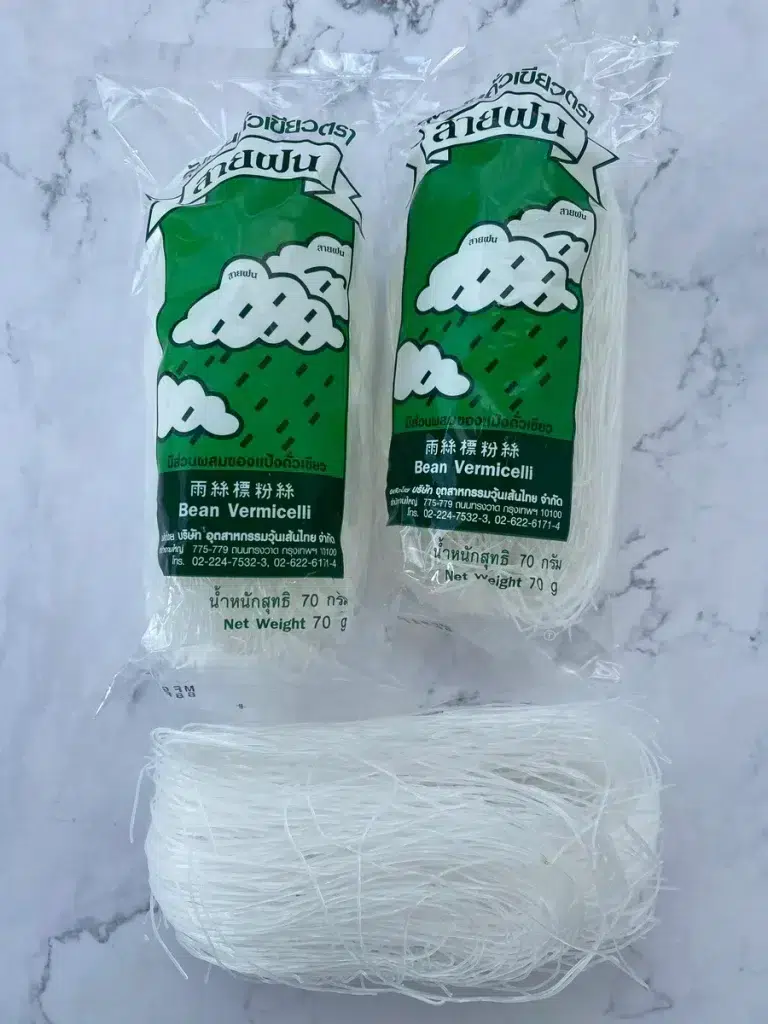
You’ve probably seen them in all sorts of Asian dishes, from Thai yum woon sen salads to soups and even spring rolls. They’re so versatile.
Just a heads-up, though – once you start eating them, it’s hard to stop. These noodles are light and easy on the tummy, but they’re not shy on the calories.
They also go by the names of mung bean noodles, bean vermicelli, and Chinese vermicelli.
Can’t get enough of Thai seafood dishes? Try the popular yum talay, a spicy Thai seafood salad – and pad ped talay, a Thai spicy seafood stir-fry.
Ingredients
Ingredients can be sourced at Asian grocery stores and Asian markets.
The exact measurements are in the recipe card at the end of this post.
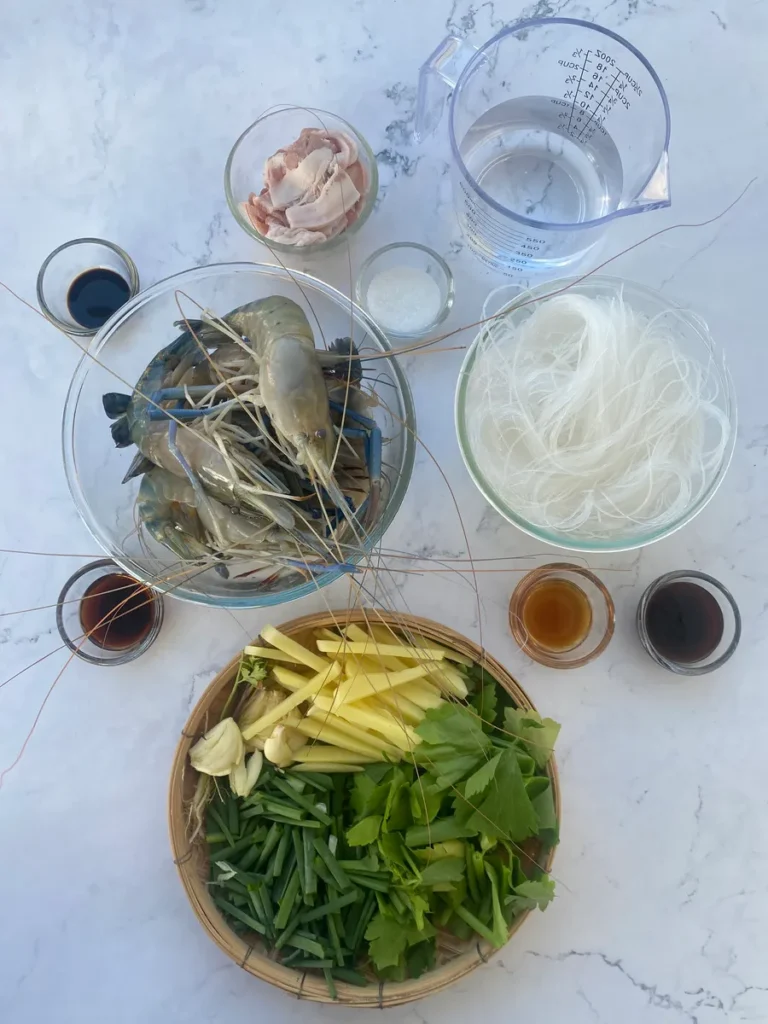
Main
- Shrimps or prawns – When making goong ob woonsen, the choice between shrimp and prawns will slightly alter the taste. Large prawns bring a slightly sweeter flavor and more meat, making them my preference. If you’re using shrimp, use black tiger shrimp, which are usually larger than others. Many Thai people, myself included, love the ritual of peeling shrimp at the table, but feel free to remove the shells beforehand.
- Glass noodles – If you’re bringing them home from an Asian grocery store, they’ll typically need to be soaked in water for about 5 to 15 minutes (depending on the brand) until they’re soft, but not overly mushy.
- Bacon – The rich fat of bacon is used instead of oil. As the bacon crisps up, it releases its rich flavor that perfectly complements the other ingredients. Optional but recommended.
- Green onions, Chinese celery, garlic, coriander root, ginger – My choice of veggies, herbs, and spices – feel free to add your favorites.
Sauce
- Black pepper or white pepper – Adds that distinct spicy kick goong ob woon sen is known for.
- Golden mountain sauce – A sauce that’s used in many Thai kitchens. It brings a unique umami, savory flavor that enhances the overall flavors of dishes.
- Dark soy sauce – Adds a rich, salty flavor and darkens the color of the noodles.
- Oyster sauce – A thick, syrupy sauce with a savory taste, making it an essential in Thai stir-fries and other dishes.
- White sugar – Sugar is key for balancing out the other flavors.
- Sesame oil – Sesame oil adds a nutty aroma.
- Water – Helps to create the right consistency for the sauce.
Cooking instructions
Combine sauce ingredients
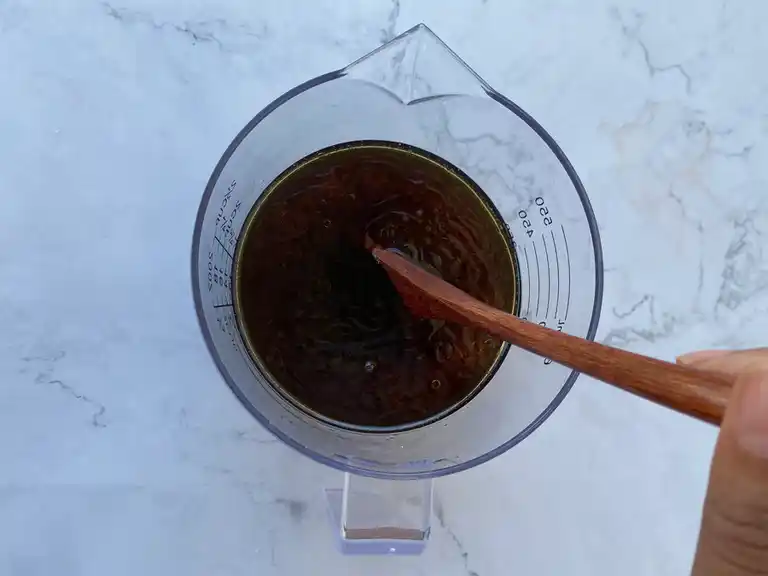
Start by mixing water, oyster sauce, dark soy sauce, golden mountain sauce, sesame oil, sugar, and black pepper in a bowl.
Soak the glass noodles
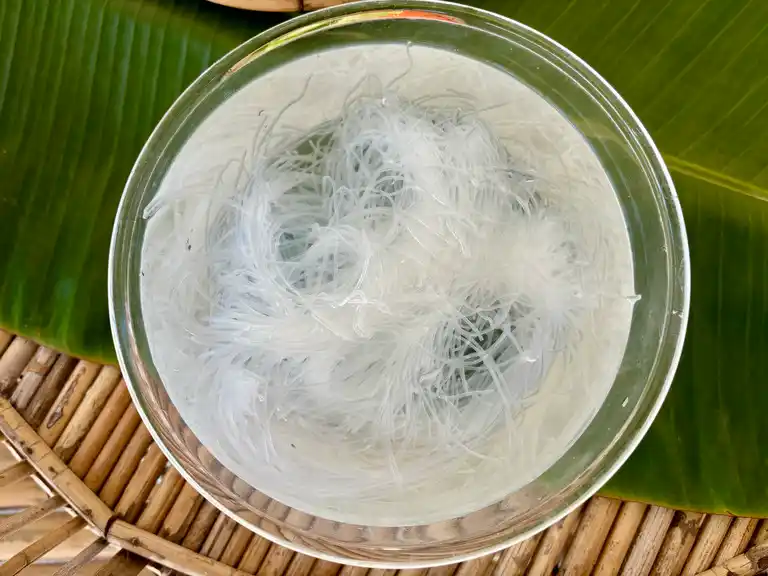
Submerge glass noodles in water for about 5–10 minutes, or until they’re soft. Follow the instructions on the packaging.
Steam
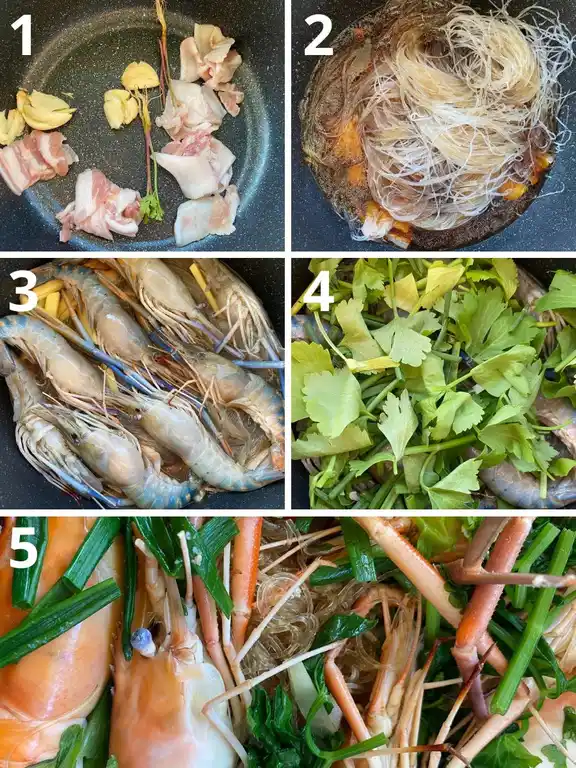
1. Prepare the aromatics: In a non-stick pot or heavy-bottomed pan, cook the bacon until its fat renders. Then, add garlic and coriander root, cooking until the garlic turns golden.
2. Add noodles and sauce: Add the pre-soaked glass noodles to the pot, pouring the mixed sauce over them to coat.
3. Layer: Place ginger slices across the noodles, then arrange shrimps or prawns in a single layer on top to evenly cook in the steam.
4. Add greens: Add a layer of Chinese celery and green onions for a fresh, crunchy contrast.
5. Steam and serve: Cover the pot, let everything cook together for 5 minutes, then remove from heat. Serve immediately.
Kitchen tools
- Cutting board & chef’s knife for slicing the ingredients.
- Measuring spoons & cups for weighing out seasonings.
- Colander for draining the noodles after soaking.
- Tongs for flipping the prawns.
- Large pot for cooking.
How to serve koong ob woonsen
Serve fresh and hot. Traditionally, goong ob woonsen makes its way to the table right in the very pot or pan it was cooked in. Place the steaming pot at the center of the table and give everyone separate dishes.
Garnish with a sprinkle of chopped green onions, coriander, or your favorite herbs.
Serve with my Thai green chili sauce for seafood.
How to store and reheat
Let the leftovers cool to room temperature. Transfer it to an airtight container. It will stay fresh in the refrigerator for up to 2 days.
Reheating instructions: Reheat your koong ob woonsen leftovers on the stove over medium heat. If needed, you can add a little water. Be careful not to overcook the shrimp.
Frequently asked questions
What vegetables can I add?
Try adding onions, bell peppers, carrots, and mushrooms. You can also add bok choy or spinach.
Is this recipe gluten-free?
No, the soy sauces contain gluten.
Is goong ob woonsen spicy?
No, this Thai dish is not spicy. However, you can add chilies to taste or pair with a spicy dipping sauce.
More Thai glass noodle recipes you’ll love
- Pad woon sen recipe (Thai glass noodle stir-fry)
- Thai vegetable soup
- Mookata recipe (Thai BBQ)
- Chicken glass noodle soup
- Thai sukiyaki
- Suki hang
Loved reading this goong ob woonsen recipe? Please make my day by dropping a star rating and/or a comment below!
Goong Ob Woonsen (Thai Glass Noodle Prawn)

Ingredients
MAIN
- 1/2 cup bacon, thin slices
- 4 cloves garlic, bruised
- 2 coriander root
- 1 cup or about 5 oz dried glass noodles
- 2 tbsp ginger, thin strips
- 2 cups or 1 lb shrimps or prawns
- 1 handful Chinese celery, roughly chopped
- 1 handful green onions, roughly chopped
SAUCE
- 1/2 cup + 2 tbsp water
- 2 tbsp oyster sauce
- 1 tbsp dark soy sauce
- 2 tbsp golden mountain sauce
- 2 tbsp sesame oil
- 1 1/2 tbsp white sugar
- 1 tsp black pepper
Instructions
COMBINE SAUCE INGREDIENTS
- Start by mixing water, oyster sauce, dark soy sauce, golden mountain sauce, sesame oil, sugar, and black pepper in a bowl.
SOAK THE NOODLES
- Submerge glass noodles in water for about 5–10 minutes, or until they’re soft. Follow the instructions on the packaging.
STEAM
- In a non-stick pot or heavy-bottomed pan, cook the bacon until its fat renders. Then, add garlic and coriander root, cooking until the garlic turns golden.
- Add the pre-soaked glass noodles to the pot, pouring the mixed sauce over them to coat.
- Place ginger slices across the noodles, then arrange shrimps or prawns in a single layer on top to evenly cook in the steam.
- Add a layer of Chinese celery and green onions for a fresh, crunchy contrast.
- Cover the pot, let everything cook together for 5 minutes, then remove from heat. Serve immediately.
Notes
- Use the nutrition card in this recipe as a guideline.




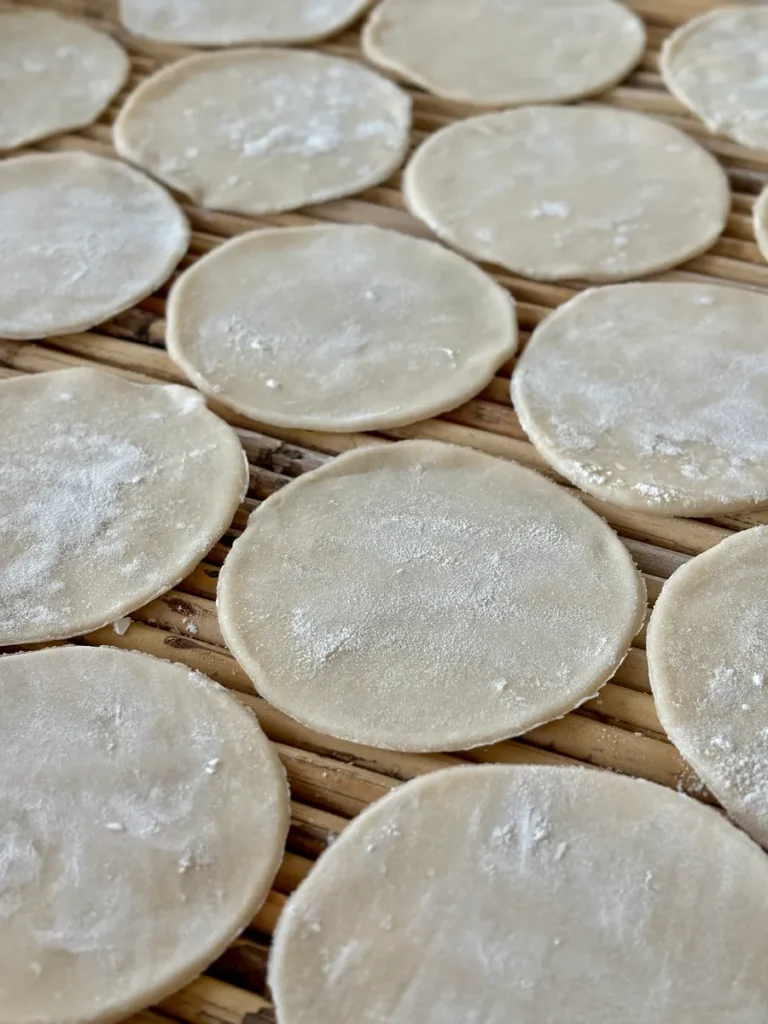
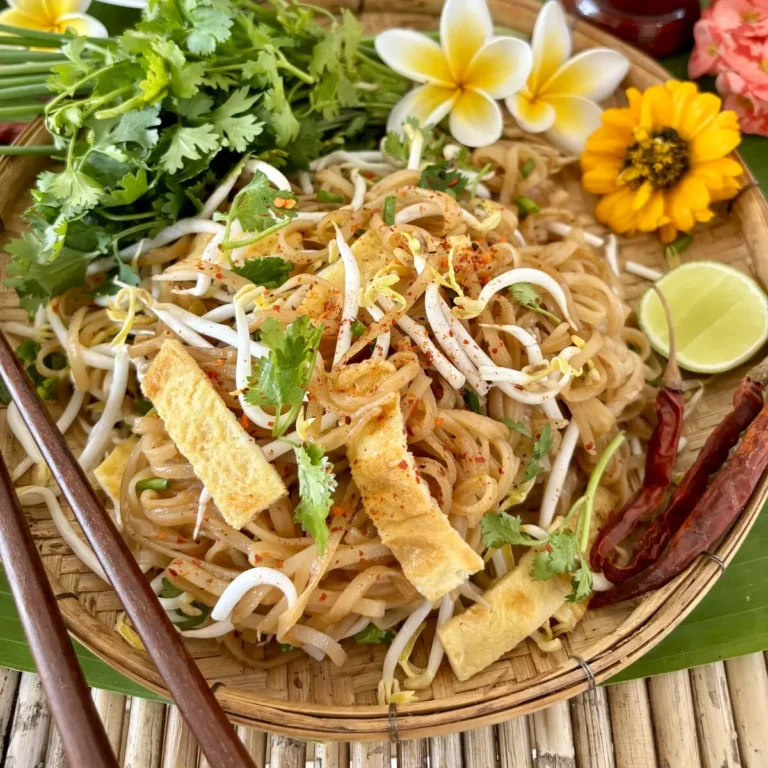

I love this recipe